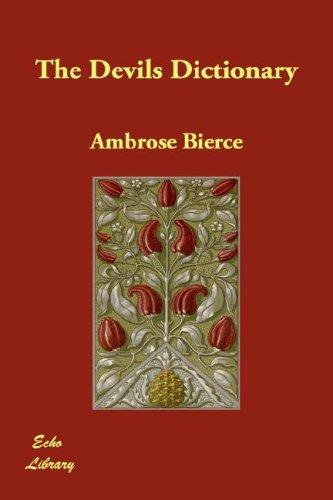 |
| Ambrose Gwinett Bierce |
“As to me, I leave here tomorrow for an unknown destination."
Thereafter Ambrose Bierce disappeared without a trace.
 |
| Pancho Villa |
There are many theories concerning what eventually happened to Bierce. In The Old Gringo, by Carlos Fuentes, the author speculates that Bierce was eventually shot in the back while serving with Pancho Villa’s band of desperados. The1998 film version of Fuentes’ book, featuring Gregory Peck (in one of his last roles) as Bierce, opts for the same ending. Local legends in the Mexican Sierras hold that Bierce, who had reportedly become somewhat critical of Pancho Villa toward the end, was executed on Villa’s orders before a firing squad.
Bierce was always a dark fellow who marched to a different drummer. The essayist Clifton Fadiman has argued that "Bierce was never a great writer. He has painful faults of vulgarity and cheapness of imagination.” However, Fadiman also notes that Bierce’s “style, for one thing, will preserve him; and the purity of his misanthropy, too, will help to keep him alive." Fadiman’s criticism of Bierce may be unfounded – Bierce wrote many columns and short stories, and his stand-out short story An Occurrence at Owl Creek Bridge, to single out one, has likely been the basis of more television and radio dramas – most recently an episode of Lost – than almost any other short story. But Fadiman is unarguably correct in his observation that Bierce’s work, and his dark streak, have kept him alive.
 While there is uncertainty as to how Ambrose Bierce met his end, what is certain is that at least one great, albeit brooding, work that he left behind vigorously survives: The Devil’s Dictionary. Since 1911 The Devil’s Dictionary, originally titled The Cynic’s Word Book, has never been out of print. Thanks to the expiring nature of copyrights and the wonders of Project Gutenberg it is also currently available on line and for free.
While there is uncertainty as to how Ambrose Bierce met his end, what is certain is that at least one great, albeit brooding, work that he left behind vigorously survives: The Devil’s Dictionary. Since 1911 The Devil’s Dictionary, originally titled The Cynic’s Word Book, has never been out of print. Thanks to the expiring nature of copyrights and the wonders of Project Gutenberg it is also currently available on line and for free.The Devil’s Dictionary, for those unfamiliar with the work, is comprised of tongue-in-cheek definitions for common English words. The definitions were written by Bierce during the period from 1881 through 1906, and were originally offered up in his newspaper columns. They derive from the commonly understood meaning of each of the defined words, but then tilt that meaning on its axis in a manner that reveals a darker underlying truth. The definitions, therefore, are not unlike paraprosdokia, the subject of a previous article, but they differ in that they are uniformly (not just occasionally) dark, and are unsparingly cynical.
But enough of introductions. Let’s dive in and examine some prime examples, still relevant after over one hundred years:
- ABSURDITY, n. A statement or belief manifestly inconsistent with one's own opinion.
- ACCORDION, n. An instrument in harmony with the sentiments of an assassin. (A little close to home, but I will address that in a subsequent column!)
- APOLOGIZE, v.i. To lay the foundation for a future offence.
- ARDOR, n. The quality that distinguishes love without knowledge.
- BAIT, n. A preparation that renders the hook more palatable. The best kind is beauty.
- BAROMETER, n. An ingenious instrument which indicates what kind of weather we are having.
- BEFRIEND, v.t. To make an ingrate.
- BIGOT, n. One who is obstinately and zealously attached to an opinion that you do not entertain.
- BORE, n. A person who talks when you wish him to listen.
- BOUNDARY, n. In political geography, an imaginary line between two nations, separating the imaginary rights of one from the imaginary rights of the other.
- CANNON, n. An instrument employed in the rectification of national boundaries.
- CHILDHOOD, n. The period of human life intermediate between the idiocy of infancy and the folly of youth -- two removes from the sin of manhood and three from the remorse of age.
- CLAIRVOYANT, n. A person, commonly a woman, who has the power of seeing that which is invisible to her patron, namely, that he is a blockhead.
- COMFORT, n. A state of mind produced by contemplation of a neighbor's uneasiness.
- CONGRATULATION, n. The civility of envy.
- CONSERVATIVE, n. A statesman who is enamored of existing evils, as distinguished from the Liberal, who wishes to replace them with others.
- CRITIC, n. A person who boasts himself hard to please because nobody tries to please him.
- CYNIC, n. A blackguard whose faulty vision sees things as they are, not as they ought to be. Hence the custom among the Scythians of plucking out a cynic's eyes to improve his vision.
- DEFENCELESS, adj. Unable to attack.
- DESTINY, n. A tyrant's authority for crime and fool's excuse for failure.
- DIPLOMACY, n. The patriotic art of lying for one's country.
- DISCUSSION, n. A method of confirming others in their errors.
- EGOTIST, n. A person of low taste, more interested in himself than in me.
- FAITH, n. Belief without evidence in what is told by one who speaks without knowledge, of things without parallel.
- FIDELITY, n. A virtue peculiar to those who are about to be betrayed.
- GENEROUS, adj. Originally this word meant noble by birth and was rightly applied to a great multitude of persons. It now means noble by nature and is taking a bit of a rest.
- HASH, x. There is no definition for this word -- nobody knows what hash is.
- HISTORY, n. An account mostly false, of events mostly unimportant, which are brought about by rulers mostly knaves, and soldiers mostly fools.
- HOMICIDE, n. The slaying of one human being by another. There are four kinds of homocide: felonious, excusable, justifiable, and praiseworthy, but it makes no great difference to the person slain whether he fell by one kind or another -- the classification is for advantage of the lawyers.
- IGNORAMUS, n. A person unacquainted with certain kinds of knowledge familiar to yourself, and having certain other kinds that you know nothing about.
- INCUMBENT, n. A person of the liveliest interest to the outcumbents.
- INFANCY, n. The period of our lives when, according to Wordsworth, "Heaven lies about us." The world begins lying about us pretty soon afterward.
- INJURY, n. An offense next in degree of enormity to a slight.
- JUSTICE, n. A commodity which is a more or less adulterated condition the State sells to the citizen as a reward for his allegiance, taxes and personal service.
- KILT, n. A costume sometimes worn by Scotchmen in America and Americans in Scotland.
- LAWFUL, adj. Compatible with the will of a judge having jurisdiction.
- LAWYER, n. One skilled in circumvention of the law.
- LOQUACITY, n. A disorder which renders the sufferer unable to curb his tongue when you wish to talk.
- MAGNIFICENT, adj. Having a grandeur or splendor superior to that to which the spectator is accustomed, as the ears of an ass, to a rabbit, or the glory of a glowworm, to a maggot.
- MARRIAGE, n. The state or condition of a community consisting of a master, a mistress and two slaves, making in all, two.
- MONARCHICAL GOVERNMENT, n. Government.
- MONKEY, n. An arboreal animal which makes itself at home in genealogical trees.
- NIHILIST, n. A Russian who denies the existence of anything but Tolstoy. The leader of the school is Tolstoy.
- NON-COMBATANT, n. A dead Quaker.
- OATH, n. In law, a solemn appeal to the Deity, made binding upon the conscience by a penalty for perjury.
- OUTDO, v.t. To make an enemy.
- PATIENCE, n. A minor form of despair, disguised as a virtue.
- PEACE, n. In international affairs, a period of cheating between two periods of fighting.
- PIETY, n. Reverence for the Supreme Being, based upon His supposed resemblance to man.
- PLEASE, v. To lay the foundation for a superstructure of imposition.
- POLITENESS, n. The most acceptable hypocrisy.
- PRAY, v. To ask that the laws of the universe be annulled in behalf of a single petitioner confessedly unworthy.
- PREROGATIVE, n. A sovereign's right to do wrong
- REALLY, adv. Apparently.
- RESIDENT, adj. Unable to leave.
- RESOLUTE, adj. Obstinate in a course that we approve.
- REVERENCE, n. The spiritual attitude of a man to a god and a dog to a man.
- RUM, n. Generically, fiery liquors that produce madness in total abstainers.
- SAINT, n. A dead sinner revised and edited.
- SELF-EVIDENT, adj. Evident to one's self and to nobody else.
- TWICE, adv. Once too often.
- ULTIMATUM, n. In diplomacy, a last demand before resorting to concessions.
- UN-AMERICAN, adj. Wicked, intolerable, heathenish.
- VOTE, n. The instrument and symbol of a freeman's power to make a fool of himself and a wreck of his country.
- HERO, n. Someone who, in a crisis, exceeds our lowest expectation. (Melissa Balmain, Rochester New York)
- MUSIC, n. Songs you listened to in college (Kevin Dopart, Washington, D.C.)
- GRAMMAR, n. The rules of language as spoken by the generation immediately preceding one's own. (Robert Schechter, Dix Hills, New York)
- SUPERCOMMITTEE, n. A committee designed by a committee (Gary Crockett, Chevy Chase Maryland)












